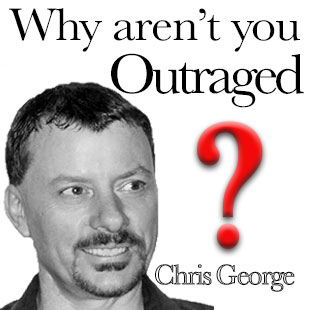
(CHRIS GEORGE / iNFOnews.ca)
November 13, 2018 - 12:30 PM
OPINION
We are in the midst of a rather severe worldwide ecological crisis. Many of us know this but simply throw our hands up in the air as we feel there is nothing that can be done.
The cultural narrative is that the damage to the ecosystems around the world is an inevitable consequence of human nature. Rich or poor, people are the primary drivers of pollution, habitat destruction, and pesticides. No thought is given to our choice of economic system as being the problem. In fact, it is pretty clear that we go out of our way to give capitalism a pass.
A devastating report on the state of wild animals worldwide came out this week.
The researchers published their conclusions, including "...that the destruction of wild habitats, hunting and pollution were to blame." Last week's story on the annihilation of the insect population of the world concluded "...the number of insects “such as beetles, butterflies, spiders and worms has decreased by 45 percent” since 1980. The reason: “loss of habitat and global climate disruption." As horrifying as both of these stories are, both bury the real reason under a layer of consequences rather than pointing to the root cause.
There is a reason for that.
Economic growth is a problem for the real world. Growth, we are told, is how we are to provide a decent standard of living for all of us here in the developed world and growth is how we are expected to lift the billions of souls in the developing world out of poverty. Growth is also seen as the only way to halt the population crisis. And it is undoubtedly working, at least in the case of the developing world.
But growth as a poverty reduction strategy can only work if that growth is reasonably allocated across the population. Inequities in how we manage our business affairs have produced severe inequality in wealth and income. The median income of households in the United States through a period of moderate economic growth has actually dropped by four per cent. Growth dropped the ball as far as its expected outcome in our society.
And the economy continues to chew through the natural world like a buzzsaw. The consequences and conclusions of the studies above hide the problem behind the symptoms.
Habitat loss is a euphemism for human development driven by the need for capital to make a return. Climate disruption is the consequence of unpriced pollution spewing from the capitalist drive to convert living things into bankable assets. Hunting is driven by people seeking trophies, stupidity like rhino horn powder, bear gall bladder, and ivory. And yes these people primarily seek to convert these living things into livings for their human families as they market the products of their enterprise to the developed world.
None of these activities have ever been priced into our economic system. We pride ourselves on how brilliant we are for being able to make a buck, yet much of our activity is the equivalent of picking things up off the ground, selling them, and then patting ourselves on the back for being innovative and hard working.
A much rounder critique than what I have penned here points out that "Life is literally free to capitalism, and so capitalism therefore quite naturally abuses it and destroys it..." because it is, after all, found money.
To begin to solve a problem we must first understand it.
Growth and our inability to price in both social and environmental costs into our economic system are the reasons why the natural world is falling apart even as our societies begin the slide once again towards war and oligarchic authoritarianism across the globe. We do ourselves no favours by allowing capitalism to hide behind the smokescreen of its consequences. We need it out in the light so we can see it for what it is.
The good news is that the global economy is a human construct. If we can build it we can change it.
The bad news is that those with the most to lose from changing that system happens to have control of the means of making changes. And time is running out for the natural world, our fellow animate beings on this planet, and ultimately time is running out for us.
— Chris George believes one measure of a just society is found in how well it balances fiscally conservative economics with social responsibility and environmental soundness in all of its living arrangements.
We welcome your comments and opinions on our stories but play nice. We won't censor or delete comments unless they contain off-topic statements or links, unnecessary vulgarity, false facts, spam or obviously fake profiles. If you have any concerns about what you see in comments, email the editor.
News from © iNFOnews, 2018